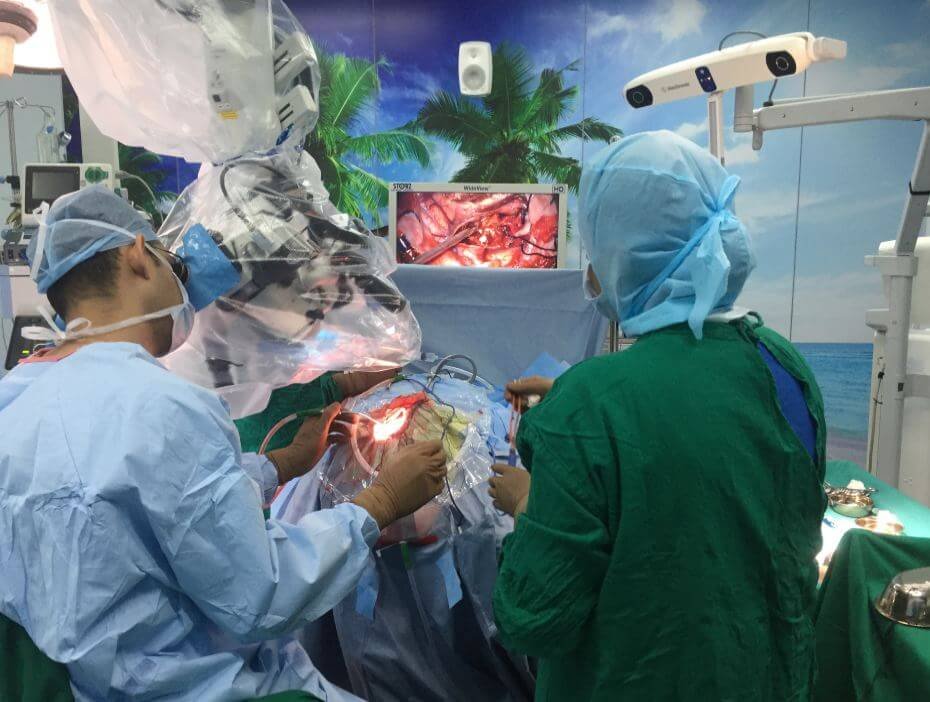Why having intuitive and skilled nurses in the operating room can make surgeons look good
“Micro scissors, please,” I requested, as I meticulously proceeded to split the sylvian fissure, a crevice which, when opened, separates the frontal and temporal lobes, providing a navigable labyrinth to deep targets without violating the substance of the brain itself. We were operating on an aneurysm of the anterior communicating artery that had ruptured. Opening a swollen and angry brain is way more complex than tempering a docile one. A neurosurgeon’s touch must be gentle and precise. Developing the right touch is the biggest challenge.
We performed the operation under the magnification and illumination of the microscope. It’s a big, burly gadget, often draped in a sterile plastic sheet that floats between the surgeon’s and patients’ head empowering us by enhancing sight well beyond the physiologic limits of the unaided eye. Five mm arteries appear like the huge underground pipes that transport water from one part of the city to the other. Even the slightest undue amount of traction or an inadvertent poke can result in the pipe bursting and an overflooding of the brain akin to the Mumbai monsoon.
Dissection in these cases often involves three basic manoeuvres: cutting with a pair of micro scissors, spreading the arachnoid with bipolar forceps, and probing with a slightly curved dissector. These steps are either repeated or alternated as the surgery is displayed on a giant screen for everyone in the room to see what’s going on.
The surgical nurse is supposed to place instruments into your outstretched hand in exactly the same position that they are supposed to go into the brain. We don’t have the luxury of taking our eyes off the microscope as one hand holds onto a suction device that serves the dual role of clearing collected fluid, with its shaft providing gentle retraction when needed. Undue retraction can avulse the dome of the aneurysm causing torrential bleeding. The other hand receives and returns instruments.
If an instrument is not placed precisely and with the right amount of pressure in a surgeon’s hand, it accentuates the stress and strain of an already difficult operation. One needs to look out of the scope or shuffle with the instrument in hand, to get it right, disturbing momentum. “I don’t have eyes on the tips on my fingers,” my boss used to say when nurses didn’t place instruments correctly into his palm. And when I used the same dialogue as I started operating independently a few years later, the nurse would almost smack the instrument into my hand – a silent but stinging way to put me in my place.
Skilled nurses often make ordinary surgeons look good. They can follow an operation and give the surgeon the correct instrument without them even asking for it. In my earlier days (and occasionally in my recent ones) nurses would suggest what next – which instrument to continue the operation with. For an average surgeon like me, “Don’t give me what I ask for, give me what I need,” is a constant plea to my maker and my nurse.
The reality of aneurysm surgery is that technical skill and surgical experience do not eliminate the risk of intraoperative aneurysm rupture. The dangerous combination of aneurysm fragility and surgical manipulation sometimes precipitates rupture and the neurosurgeon must prepare for this catastrophe. This is when the surgical nurse
exemplifies their deftness. A systematic contingency plan has to be discussed before every operation, with both the surgeon and nurse envisioning an intraoperative disaster in every conceivable form and then develop strategies to deal with it.
And that’s exactly what happened in this operation. After an hour of perfectly executed steps, the aneurysm ruptured, flooding the brain with blood. When this happens, there is an intense rush of emotions: surprise, confusion, regret, tension, anger, and even frustration, and every surgeon goes through all or some of these depending on their levels of experience. These moments demand calmness, clarity, and confidence. We must continue to think and operate simultaneously.
The nurse promptly handed over a third suction, allowing me to tamponade the bleeding with a cottonoid. A pre-loaded temporary clip was slieghtfuly transferred, which reduced the flow of blood to the aneurysm and allowed us to visualize the site of rupture so that we could place a permanent clip to secure the aneurysm. The nurse almost guided my hands naturally through the critical steps, transforming an emotional response into an intuitive one, resulting in a successful outcome. “The difference between triumph and disaster isn’t about the willingness to take risks,” says famous writer-surgeon Atul Gawande, “it’s about the mastery of rescue.”
I leaned – metaphorically, not literally – a lot on my nurses as a young doctor. What I gleaned from them in my training couldn’t be learned from textbooks or even other doctors. I started my training in neurosurgery as a registrar in the neuro ICU at the Christian Medical College in Vellore. The nurses taught me little tricks such as how to insert lines, adjust ventilator settings, manoeuvres to reduce intracranial pressure, and even decide on the right time to get a scan done in critical patients. They would even allow me to get a few winks of sleep while they salvaged a critical patient overnight and were happy to hand over the credit to me in front of the chief the next morning.
Even today, there are nurses who offer me suggestions on how to make the operation better and I am indebted to them for those. They pick up nuances from working with other surgeons, find it relatively effortless to enhance the quality of the current case, and don’t hesitate to impart that knowledge. We are fortunate to be surrounded by nurses who are astute, wise, and compassionate. There must be a karmic connection for me to have been born on a day that’s celebrated as International Nurses Day, commemorating the birth of Florence Nightingale, the foundational philosopher of modern nursing, on the 12th of May in 1820.
There are some surgeons who will not operate on certain cases if their dedicated nurse is not available on that day. Some departments have that luxury, others don’t. “If you’re not in sync with your wife, it’s okay, but make sure you get along with your surgical nurse!” a famous surgeon once said in a conference when he spoke about how to deal with intraoperative aneurysm ruptures. To circumvent this, Prof. Yasargil, now in his 90s and who is hailed as one of the greatest neurosurgeons of the 20th century, was married to Dianne, the nurse in charge of his operating suite and who assisted him in almost all his surgeries for several decades. Now that gives work from home a whole new meaning.





